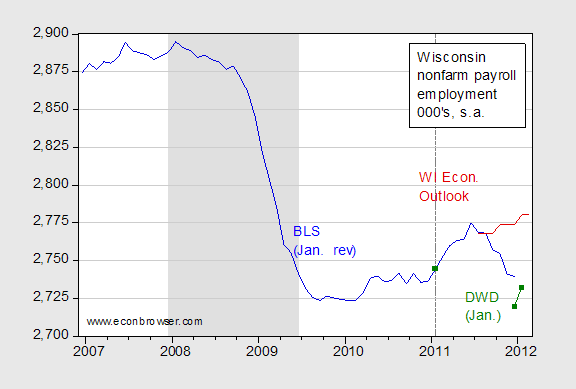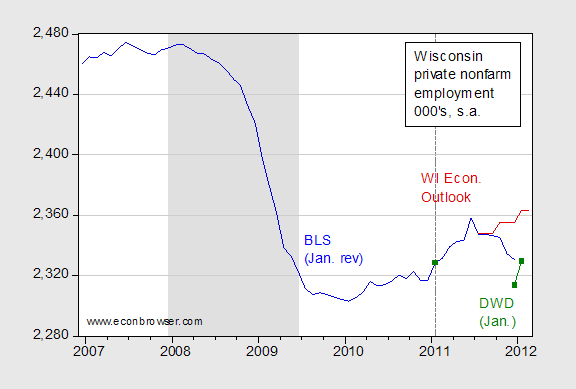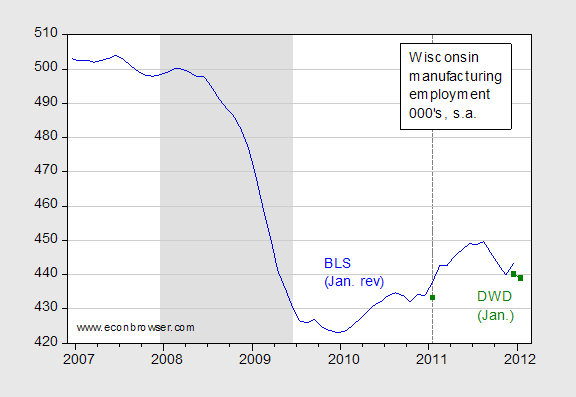The Wisconsin Department of Workforce Development today released figures for January employment revised to account for benchmark revisions. Nonfarm payroll employment and nonfarm private employment both rose. But the latter just barely exceeded levels of a year previous, while nonfarm payroll employment fell short.
Figure 1 presents the nonfarm payroll employment series, while Figure 2 presents the private nonfarm employment series. The red lines indicate the forecasts from the government’s October Wisconsin Economic Outlook.

Figure 1: Wisconsin nonfarm payroll employment from BLS, January release (blue), WI Department of Workforce Development, January release (green), and projections from Wisconsin Economic Outlook (red), in 000’s. NBER defined recession dates shaded gray. Vertical line at 2011M01. Sources: BLS, October Wisconsin Economic Outlook, WI DWD (3/8/12) and NBER.

Figure 2: Wisconsin private nonfarm payroll employment from BLS, January release (blue), WI Department of Workforce Development, January release (green), and projections from Wisconsin Economic Outlook (red), in 000’s. NBER defined recession dates shaded gray. Vertical line at 2011M01. Sources: BLS, October Wisconsin Economic Outlook, WI DWD (3/8/12) and NBER.
Apparently, the Wisconsin employment situation was less bright in December 2011 than originally reported, according to the latest available data.
As many have remarked (it hit 64 degrees fahrenheit the day before yesterday!), it has been unseasonably warm in Wisconsin this Spring. Hence, is of interest to consider what the change in the not-seasonally-adjusted employment numbers are. Surprisingly (to me), the net loss from January to January in nonfarm employment is 19,400, and the net loss in private employment is 900 7000 [h/t Jake formerly of the LP] (i.e., both n.s.a series declined y/y in January).
This article from five days ago, entitled “Wisconsin missing out on U.S. jobs gains,” (by Schmid and Gilbert, Journal Sentinel) summarizes some potential explanations for Wisconsin’s lackluster employment performance.
“The rest of the nation is moving upwards. We’re one of the few states moving downward. There’s something wrong,” said economist Steven Deller of the University of Wisconsin-Madison.
The United States as a whole has added private-sector jobs 23 months in a row, including almost a half million jobs in the past two months.
But Wisconsin has been moving in the opposite direction, a trend that not only threatens Gov. Scott Walker’s campaign promise but could cloud any message of economic renewal as the state heads into an all-but-certain recall election this summer.
An analysis of jobs data shows that Wisconsin lags the nation in a number of ways that reflect grimly on its economy:
Wisconsin has lost more private-sector jobs (an estimated 27,700) than any state in the country since the middle of last year (July through December), according to the U.S. Bureau of Labor Statistics. Only one other state, Missouri, is close, losing about 19,000 jobs in that stretch.
Although the state added more than 41,000 private-sector jobs in the first half of 2011, losses in the second half of the year have wiped out most of those gains, according to the Bureau of Labor Statistics.
Despite an uptick in December, Wisconsin has the biggest six-month decline in manufacturing jobs in the nation after California. That’s significant because Wisconsin depends more on manufacturing for jobs than any state but Indiana. It’s also significant at a time when a renaissance in manufacturing is helping drive the national recovery.
Wisconsin’s job losses can’t be readily explained as part of a broader pattern involving Midwestern or industrial states. Wisconsin’s neighbors are all outperforming the state when it comes to job growth over the past six months.
Wisconsin also lags in some broader measures and forecasts. The most recent leading indicators for each of the 50 states, compiled by the Philadelphia Federal Reserve, identify Wisconsin as one of only six states expected to contract in the first half of this year.
Walker declined an interview request, but he and his administration have painted a much brighter economic picture than these numbers suggest.
“Governor Walker’s policies have helped turn Wisconsin around,” said his communications director, Chris Schrimpf.
[Emphasis added in bold — MDC]
…
The observation regarding manufacturing is particularly interesting. Figure 3 presents a time series plot for manufacturing employment.

Figure 3: Wisconsin manufacturing employment from BLS, January release (blue), WI Department of Workforce Development, January release (green), in 000’s. NBER defined recession dates shaded gray. Vertical line at 2011M01. Sources: BLS, WI DWD (3/8/12) and NBER.
As a point of comparison, manufacturing employment nationwide is rising 2% y/y through January).
Parting note: Latest readings on Wisconsin’s leading indicators (for Dec 2011) are negative, according to the Philadelphia Fed. See this post for a graph; these indices will certainly be revised in light of the January employment figures.
I’m thinking Gov. Walker wins just like the judge and the state senators did. People voted for reform in 2010, and Gov. Walker has delivered on his promises.
Seems like a big expensive exercise in greedy union futility to me.
I love it when ideological “facts-are-optional” dingbats from out-of-state run their yaps like W.C. Varones. Walker’s an unmitigated disaster whether it’s jobs, fiscal standing (his budget already has a $200 million deficit when it has to be balanced by law), or in cleaning up government (5 Walker aides have already been arrested for corruption, more will follow).
In fact, Menzie is short-selling just how bad Wisconsin is doing. And the downturn directly coincides with the taking of collective bargaining rights in March, and the Walker budget passing in June.
You bet Wisconsinites are going to be voting for reform- to fix what these idiots have messed up. Remember, the U.S. economy has been recovering and picking up steam while Wisconsin has collapsed.
P.S. Menzie- the non-seasonally adjusted private sector change from Jan 2011- Jan 2012 is actually -7,000 NOT +900 (that’s the seasonal number). Always here to help :P.
The warm winter is an interesting point, as I read a solid article today on Yahoo! finance mentioning that the weather could be pulling some jobs forward for January and February, and will reduce some growth for Spring as a result (since the seasonal work has already happened).
Jake: Thanks for catching that — fixed now.
W.C. Varones: Do you have any data or information to add?
There is little doubt that Wisconsin is in turmoil and politically out of control, but is that Gov. Walker’s doing? Walker has been attacked nationally ever since he has been in office and his changes have been tenuous. The unions have ruled Wisconsin for decades and will not give the power back to the people easily.
There are different ways to interpret data. One would be to assume that Wisconsin is not in a booming recovery because of the policies of the new government. But equally valid is that even with the reforms of the new government the surrounding states have moved more quickly and their changes are more sound than those in Wisconsin.
It seems pretty clear that Wisconsin has been headed in the wrong direction for decades. The political powers are determine not to allow it to turn. Under these circumstances a sudden turn around would be truely remarkable. The fact that Walker has saved the Wisconsin schools and teachers jobs, and that the state does seem to be turning the corner would seem positive, but the continuing uncertainty of what the Wisconsin political landscape will look like tomorrow will deeply depress the state until the people choose recovery over union thugs.
“The beatings will continue until morale improves.”
In Wisconsin one cannot hire an out of work machinist for $35 per hour. In Texas you can hire one for $22.50 per hour. I believe that there is more to the story than just Walker’s politics.
JLR: And this differential occurred discretely starting 2011M07, so that Wisconsin’s employment correlation with the rest-of-Midwest broke down?
In any case, I would argue it’s not the politics, it’s the form and nature of the budget retrenchment — see here and the cited Milwaukee Sentinel Journal article.
Had to note this line from the guy who misuses the name “Ricardo”: “But equally valid is that even with the reforms of the new government the surrounding states have moved more quickly and their changes are more sound than those in Wisconsin.” This is just plain an ignorant statement. It isn’t true at all and certainly isn’t “equally valid.”
But the point, as I read Menzie’s post, is that promises were made about the effect of these changes and these have not come true. They have not come close to coming true. That is undeniable.
Keep this in mind when you hear Romney’s tax plan. It makes two claims. One is that they’ll cut loopholes and thus “broaden” the tax base in unspecified ways. (I don’t know what “broadening” means other than raising taxes.) They don’t want to say what those changes are because no one would vote for them. But the other claim is that his massive lowering of tax rates – especially for the best off – would spur such growth that projections don’t matter. The actual projections are an increase to the deficit of $500B in one year and then more each year after – assuming there isn’t $500B in loophole closing and tax base “broadening”. I mention this because promises have costs.
“But equally valid is that even with the reforms of the new government the surrounding states have moved more quickly and their changes are more sound than those in Wisconsin.”
Please exclude Illinois from the more sound camp.
Menzie,
My data are the recall and Kloppenburg election fails.
W.C. Varones: That’s what we in the real world call “forecasts”, not data.
Walker’s policies are ‘saving’ jobs. I suspect that he has saved upwards of 100,000 jobs.
Since Menzie and the other Obama sycophants who troll here have used the ‘saved jobs’ argument to defend the pro-union, pro crony capitalism of Obama, it ought to work for Walker too.
barry: Yes, if we had a single econometric study that I could track down that said that, then I’d be amenable to that argument. Do you have one? Inquiring minds would like to know.
Menzie, some of these pictures offer really compelling evidence that Scott Walker’s budget is destroying Wisconsin: after the July budget was passed, employment fell.
However, the pictures suggest that manufacturing also fell at the same time. How has Scott Walker affected manufacturing employment in such a short time period — either immediately after his budget or six or so months after becoming governor?
I’d like to rephrase my last comment. Menzie, my concern is that while what you’re showing above is consistent with the fiscal contraction, it is also consistent with a downturn in the major Wisconsin employment base of manufacturing. Isn’t the manufacturing contraction unlikely to occur as a result of the budgetary contraction (in the short run)?